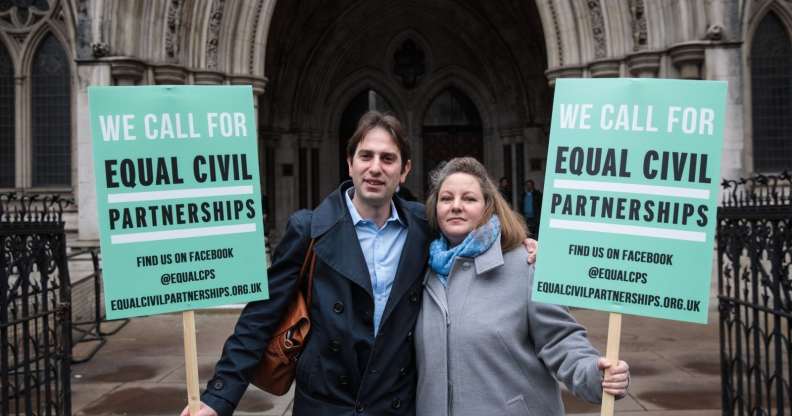Civil partnerships for UK straight couples will be legal from New Year’s Eve

Charles Keidan and Rebecca Steinfeld (Jack Taylor/Getty Images)
From New Year’s Eve, opposite-sex couples in the UK will be able to enter into civil partnerships, an option previously only available to same-sex couples.
Tony Blair’s Labour government introduced civil partnerships in 2004 as a segregated form of union for same-sex couples, separate from marriage.
The system was left in place when equal marriage was introduced in England and Wales in 2013, but in June 2018, the UK’s Supreme Court ruled that it was unlawful to prevent straight couples from entering civil partnerships.
The Supreme Court ruling came after a lawsuit brought by straight couple Rebecca Steinfeld and Charles Keidan, who said that the current law discriminates against them.
They argued that not all couples are comfortable with the idea of marriage, but want the economic and legal protections it brings.
Following the government announcement that opposite-sex civil partnerships would be legalised, then Prime Minister Theresa May said: “This change in the law helps protect the interests of opposite-sex couples who want to commit, want to formalise their relationship but don’t necessarily want to get married.
“As Home Secretary, I was proud to sponsor the legislation that created equal marriage. Now, by extending civil partnerships, we are making sure that all couples, be they same-sex or opposite-sex, are given the same choices in life.”
While the number of same-sex civil partnerships has plummeted to just a few hundred per year since the legalisation of same-sex marriage, the government has predicted that as many as 84,000 ceremonies will be conducted for straight couples in 2020.
Elaine Tarling, 49, has been with her partner Matt, 51, for 31 years and they plan on having a civil partnership ceremony.
Tarling told the BBC: “The whole idea of marriage seems to us to be archaic and outdated as it is based on patriarchy and gender inequality. Our whole relationship is and always will be, equal, whilst remaining individuals.
“This gives us the opportunity to commit to one another legally, without the fuss and palaver of the conventional getting hitched.
“The legal benefits provide our future security – despite popular conceptions, currently co-habiting couples have no legal status in law concerning rights that married couples have over each other’s legal affairs.”

